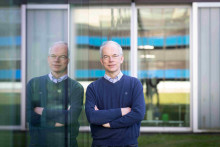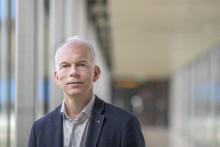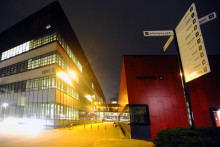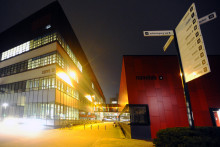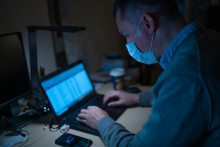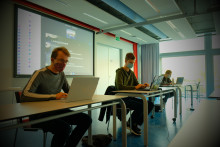Covid-19 spreads mainly through small droplets in the air, better known as aerosols. According to Detlef Lohse this is obvious. ‘The crucial role of aerosols in the spread of the virus has been internationally accepted since April last year. In the Netherlands we now seem to have reached that point too. Apparently it's all taking a bit longer here.’
The latest study by his Physics of Fluids group into these aerosols was published this week as cover story in Physical Review Letters, the most renowned journal in the field of physics. One key question from the study is: How does the relative humidity affect the lifetime of aerosols? ‘Our simulations show that the small droplets can remain airborne for a very long time after speaking, shouting, coughing or singing indoors. And when one inhales these aerosols containing virus particles, one becomes infected with the virus.’
It depends on the circumstances how long exactly the aerosols remain in the air, Lohse says. ‘It takes much longer for aerosols to disappear from the air when the relative humidity is high. Then the droplets can also travel much longer distances. That is why one and a half metre distance is not sufficient. Such a distance is based on outdated models. Proper ventilation of the room, air filters and the regulation of the relative humidity are very important to prevent the coronavirus from spreading indoors.’
In addition, according to Lohse, wearing a face mask is very important. Preferably the so-called FFP2 masks, that provide much better air filtration. 'In the early months of the crisis, the emphasis in the Netherlands was almost entirely on the spread through direct contact. Those days infection by direct contact was overestimated. The majority of infections is airborne, namely via aerosols.’
Dutch policy
Already in October, Lohse and a group of scientists warned that the Dutch Covid policy was failing. According to them, the government did not sufficiently base its policy on the latest scientific insights. ‘The government made incorrect statements on the effect of face masks – that they are supposedly of no use, and then later makes face masks mandatory. This adds to the skepticism about the policy. Nevertheless, I think that meanwhile there are reasonable Covid measures in the Netherlands, and making FFP2 masks mandatory indoors and enforcing the measures would further improve the situation. However, presently the main problem is that many people don't comply with the measures anymore. That is partly due to the policy that has been pursued. At the same time, other countries are not doing much better.’
Fundamental research
But there are still many remaining open questions on aerosols, Lohse acknowledges. How many virus particles are in a drop of a certain size, for example? And are dried out droplets infectious – and for how long? There are no conclusive answers to these questions yet. ‘That's why fundamental research is needed,' says the professor. ‘We might think: vaccinations will solve the problem in a few months' time. But I really don't believe that. What is needed most of all is basic research on how this virus really works and spreads. We must also be ready for the next pandemic to come. And it will.'
A first step towards this fundamental knowledge came this summer when Lohse and his team received half a million euros from the medical science funding agency ZonMW, namely to investigate the role of aerosols in the spread of the virus. The recent publication in Physical Review Letters is also part of this project. The team from Twente works together with the University Medical Center Groningen. In Groningen, virologists study how many viruses are contained in the small droplets and whether these are infectious.
In the future, the fundamental knowledge on aerosols should lead to recommendations about appropriate filters (in face masks), ventilation, the optimal relative humidity and other conditions that may affect the spread of the virus. The changing weather will presumably give us some room to breathe next summer - as was the case last year. ‘Indeed, the summer seems to slow down the spread of the virus.’ But Lohse is being cautious. ‘We do not yet know how large the impact of the new mutations will be. For now, we will have to wait and see and be very cautious.’


